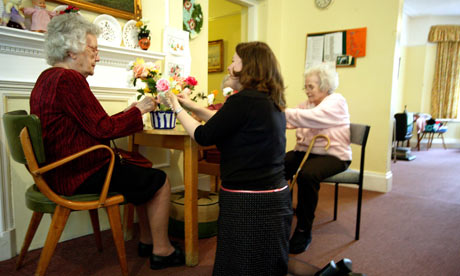Thousands of dementia sufferers told they must have surgery to gain entry
- The Guardian, Wednesday 6 January 2010
- Article history

Many care homes will not take a patient until they have a feeding tube fitted. Photograph: Frank Baron
There is no evidence that tube feeding prolongs life, and it deprives patients of the pleasure and social contact involved in normal eating and drinking, says a Royal College of Physicians working group which recommends that artificial nutrition should only be used as a last resort.
The report found that many care homes across the country are making it a condition of residence that people, often in the advanced stages of dementia, have a tube fitted into their abdomen.
"This is an invasive procedure with a risk, so it should not be undertaken lightly," said Dr Rodney Burnham, chair of the working group. "One of the concerns we had was that we felt in many places there were cases where this was done without proper thought.
"This is a widespread problem. Many care homes say they will not take a patient until they have had a gastrostomy. There is no reason for them to do that. They should have nursing support."
With time and care, elderly people with swallowing difficulties can be helped to eat and drink normally, says the report.
Produced with the help of the British Society of Gastroenterology, the report aims to guide healthcare professionals, who are sometimes at odds over the merits and ethics of the situation. There is a misguided belief, it says, that tube feeding keeps patients alive longer. But the evidence does not support this.
A recent national confidential inquiry into patient outcomes and death (NCEPOD) investigation found 19% of those undergoing the procedure had it fitted inappropriately. "They described it as futile," said Burnham. Almost half of those who died (43%) did so within a week.
While a nasal tube is safer than a device fitted in the abdomen, a so-called PEG, the best option for patients is normal feeding wherever possible. "'Nil by mouth' should be a last resort," says the report.
It calls for agreement between the patient, relatives and healthcare professionals about the aims of artificial feeding. "Such decisions should never be based on the convenience of staff or carers. Nor should artificial feeding ever be required as a criterion for admission to any institution providing care," says the college.
All trusts and care homes should ensure there are enough staff to help those with difficulties take longer to eat, especially at meal times. "People in the later stages of dementia have complex end-of-life needs and it is vital that the use of artificial nutrition or hydration not be used in place of good quality care tailored to their specific needs," said Neil Hunt, chief executive of the Alzheimer's Society, which believes that "the quality of life should be considered a priority over length of life in the later stages of dementia".
The numbers of people in the community fitted with tubes for artificial feeding has risen steeply. One survey showed a growth of 11.6% between 2006 and 2007.
A Department of Health spokesperson said: "The use of intrusive interventions, such as tube feeding, is a clinical decision and should only be used when necessary, based on the circumstances of the person concerned, and with their or their representative's agreement. We would expect services to allow maximum choice and control wherever possible and to respect people's dignity and human rights right up to the end of life."



No comments:
Post a Comment